Archived Content
The National Institute of Mental Health archives materials that are over 4 years old and no longer being updated. The content on this page is provided for historical reference purposes only and may not reflect current knowledge or information.
10th Anniversary Conference: Global Mental Health Research Without Borders
Date
Location
The NIMH Center for Global Mental Health Research (CGMHR) and Grand Challenges Canada co-convened the 10th anniversary global mental health conference, April 8-9, 2019, on the main campus of the National Institutes of Health. More than 400 researchers, innovators, and other stakeholders from 36 countries attended the two-day conference, where they learned about findings from cutting-edge science and new opportunities for groundbreaking research to address the Grand Challenges In Global Mental Health .
Day 1
The conference kicked off with welcoming remarks from Joshua Gordon, NIMH Director; Shelli Avenevoli, NIMH Deputy Director; Shane Green, Director General of Development Innovation at Grand Challenges Canada; and Beverly Pringle, Director of NIMH’s newly established Center for Global Mental Health Research.
Pamela Collins, former Director of NIMH’s Office for Research on Disparities and Global Mental Health, gave an opening keynote address, highlighting the progress that researchers have made over the past 10 years in addressing the Grand Challenges In Global Mental Health . She highlighted some of the key research and policy activities that have emerged from the Grand Challenges, including work on biomarkers, genomics, prevention, interventions and integration of mental health care into primary care. Dr. Collins also emphasized the importance of continuous advocacy and inclusive conversations to exchange ideas across borders.
Beverly Pringle highlighted other aspects of progress in global mental health research, including the blurring of borders between the Global North and Global South. Co-creation of new scientific knowledge is increasingly common among researchers in low-, middle-, and high-income countries, she observed, and mental health reforms in countries such as Peru and India are providing guide posts for other countries. Dr. Pringle also noted steady growth in the annual mental health research conference since its inception in 2010. This year, participation reached an all-time high, with more than 400 attendees from 36 nations. 2019 was also the first year that conference planners issued a call for abstracts on original and innovative global mental health research, resulting in a rich program of symposia, papers, and posters. In addition, NIMH now has a Global Mental Health Research Center and a new cross-Institute Global Mental Health Team.
The morning plenary session featured talks by leading researchers who identified new challenges and opportunities in the areas of scaling up mental health care and implementation science. On the topic of implementation science, Brian Oldenburg, University of Melbourne Australia, exhorted the audience to be bolder in attempts to improve mental health at the population level. Lisa Marsch, Dartmouth College, USA, noted the untapped potential of digital health technologies in mental health care. Olakunle Alonge, Johns Hopkins University, USA, highlighted the need to use innovative methods to study the complexities of scaling up mental health services.
Breakout sessions on day 1 included six symposia and three paper panels:
- Symposium: Effectiveness, Adaptation, and Implementation of Three Collaborative Care Studies from India and Nepal
- Symposium: Special Populations and Psychiatric Research: Importance of Well-Assembled Global Collaborations to Mainstream Scientific Psychiatry
- Symposium: Innovations to Scale-Up the Thinking Healthy Programme for Perinatal Depression: Lessons from India and Pakistan
- Symposium: Developing Partnerships to Strengthen Mental Health Research and Health Systems among Crisis-Affected Populations: Lessons from Sierra Leone, Liberia, and Creating Global Guidance
- Symposium: The Intergenerational Impact of Maternal Depression and Its Treatment: Key Findings from the Bachpan Cohort
- Symposium: Suicide Risk and Related Behavioral Health Problems among American Indians & Alaska Natives: Detection and Management in Primary Care
- Paper Panel: Integrating Mental Health into Primary Care and Specialty Care for Chronic Diseases
- Paper Panel: Co-treating HIV and Depression in Low-Resource Settings
- Paper Panel: Sustainable, Evidence-Based Mental Health Care for Youth
The closing plenary session on day 1 addressed prevention research. Fred Ssewamala, Washington University at St. Louis, USA, reminded conferees that mental illnesses can be prevented by addressing key social determinants of ill-health, such as economic deprivation. Alexandra Fleischmann, World Health Organization, laid out the many research challenges and opportunities we face in preventing suicide around the world. Arvin Bhana, University of Kwazulu-Natal, South Africa, discussed the critical importance of preventing mental illnesses among community health workers, who are key providers in the global scale up of mental health services.
Day 2
Day 2 of the conference opened with a plenary session on challenges and opportunities in the neuroscience of mental illnesses. Vishwajit Nimgaonkar, University of Pittsburgh, USA, argued that trainees are the best new opportunity for advancing basic mental health research around the world. Noeline Nakasujah, Makerere University, Uganda, raised a host of research questions emerging from her clinical practice with individuals suffering from serious mental illness. Robert Paul, University of Missouri, USA, presented a conceptual framework for using big data to accelerate advances in discovery science.
Sandro Galea, Boston University, USA, gave a stimulating keynote address challenging researchers to achieve better outcomes for more people globally by broadening the scientific agenda beyond personalized clinical care to address population mental health. He explained how a population-based approach that addresses ubiquitous and preventable causes of mental illness could reduce the burden of disease worldwide.
Breakout sessions on day 2 included six symposia and two paper panels:
- Symposium: Turning Research into Practice in Providing Treatment for Trauma Survivors: Lessons Learned in Moving from Clinical Trials to Sustained Practice Across Interventions and Settings
- Symposium: Scaling up Science-Based Mental Health Interventions in Colombia: Formative Work, Design, and Initial Results of Implementation Research
- Symposium: Reducing Stigma in Community and Clinical Settings to Improve Mental Health Services and Clinical Outcomes: Innovations in Evaluating Stigma and Partnering with Service Users
- Symposium: Research to Social Change: Effects of the Bucharest Early Intervention Project on Child Protection in Romania
- Symposium: Implementation Science as a Catalyst for Sustainable Research Capacity Where it is Underdeveloped
- Symposium: Latin America: Integrating Mental Health into Primary Care with Digital Assistance
- Paper Panel: Identifying the Many Faces of Trauma and Addressing its Effects
- Paper Panel: New Therapeutic Targets, Biomarkers, and Predictors
Devora Kestel, Director of Mental Health Services and Substance Abuse at the World Health Organization, spoke at the final plenary on the importance of partnerships for amplifying the impact of global mental health research and program and policy development. She discussed how networks are building and changing the landscape of mental health services globally. She also described global mental health as an expanding movement – yet challenged the audience to keep questioning who is not represented, whose voices are not being heard, and how can we be more inclusive.
Dianne Rausch, Director of the NIMH Division of AIDS Research, closed the conference with an overview of global research challenges and opportunities shared by mental health and HIV/AIDS. Implementation science is a priority for both mental health and AIDS research, as are the need to develop more effective interventions and accelerate discovery science. Dr. Rausch outlined the mental health issues so critical in HIV care and research and stressed the global challenges in addressing the intersection of HIV infection, mental illness, and stigma. While the increasing awareness of global mental health is to be celebrated, there is more work to be done to achieve sustainable gains and continued advances. In this, there are lessons the mental health community can learn from AIDS researchers and advocates.
Additional Sessions
Poster Sessions. Two poster sessions featured 40 poster presentations by researchers at all career stages. The poster sessions stimulated thoughtful and dynamic exchanges among conferees on the science of global mental health.
Networking Roundtables. Students, trainees, post-docs, and early-stage investigators joined senior investigators, advocates, policy leaders, and NIMH staff for lively discussions at semi-structured lunchtime roundtables. These roundtables involved discussion of research funding, communication with policymakers, and community engagement, among other topics.
Workshop on Writing a Grant Application. In conjunction with the conference, the NIMH Center for Global Mental Health Research hosted a workshop on preparing a grant application for peer review. The workshop, held on April 10, 2019, was designed for graduate students, trainees, early-career/early-stage investigators, and others with limited experience with the NIH grant application process. Staff from NIMH and other NIH Institutes and Centers presented on topics such as research concept development, grant application preparation and submission, scientific review (including a mock peer review panel), clinical research guidelines, and identifying funding opportunities and research resources for global mental health research and training. Participants networked with NIMH and other NIH staff members, shared their experiences of applying for NIH funding, and discussed potential research questions for global mental health grant applications.
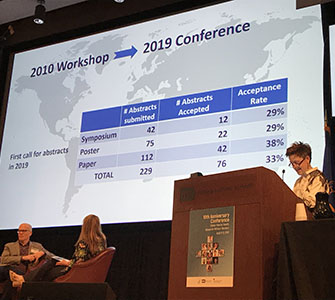
Mental Health Research
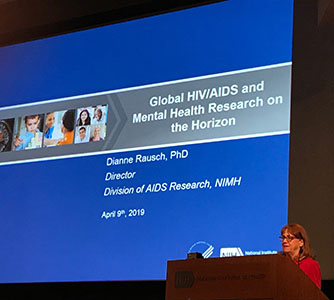
of AIDS Research
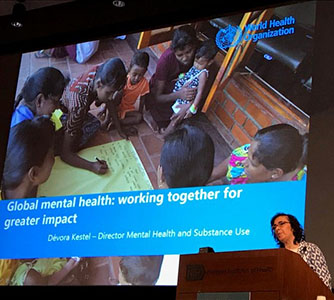
and Substance Abuse, World Health Organization

Nimgaonkar, University of Pittsburgh; Noeline
Nakasuja, Makerere University; Robert Paul,
University of Missouri; and Jeymohan Joseph,
National Institute of Mental Health
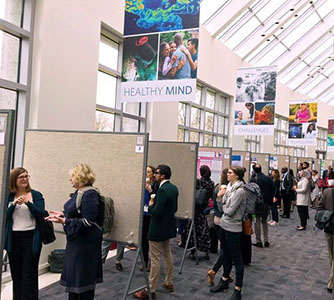
Anniversary Conference
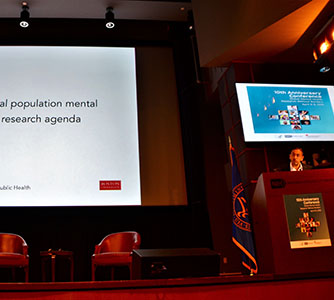
University School of Public Health
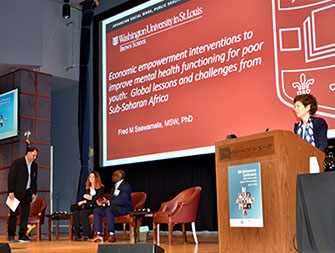
South Africa Medical Research Council;
Alexandra Fleischmann, World Health
Organization; Fred Ssewamala, Washington
University at St. Louis and Eve Reider, National
Institute of Mental Health
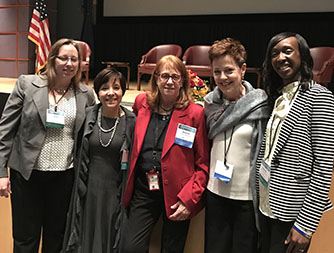
Dianne Rausch, Beverly Pringle, Makeda Williams,
National Institute of Mental Health
